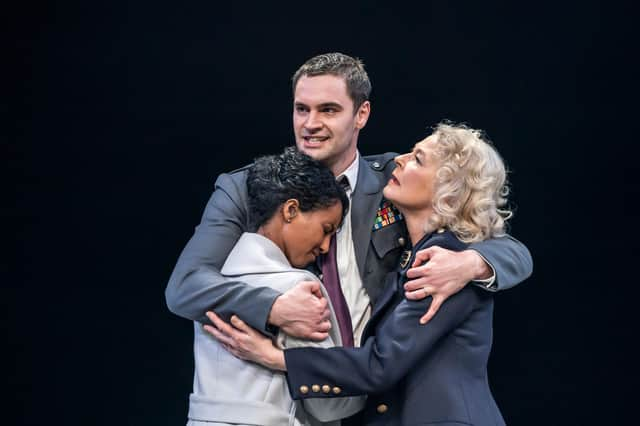Convincing conflicts and riveting political manouevres in Coriolanus at Sheffield's Crucible Theatre


Once again, the forum-shaped auditorium at the Crucible Theatre becomes a senate; and Sheffield People’s Theatre become Roman citizens – demanding change and greater democracy, and giving the people’s cause an authentic local voice.
It starts with a track-suited figure jogging on the spot. The figure is Coriolanus, a soldier turned politician, held in awe for his achievements in war but lacking in empathy for the common people. Tom Bateman plays him with an edgy intensity – brave, driven, arrogant.
Advertisement
Hide AdAdvertisement
Hide AdOne scene flows into another. We move between different cities, and between indoors and outdoors.
There’s a wonderful exchange between Virgilia, the wife of Coriolanus, Volumnia, the mother of Coriolanus, and Valeria, a female friend. Virgilia fears that her husband will not return from the war with the Volsces. Volumnia is disdainful – she claims to value honour above human life. Virgilia is played by Hermon Berhane, who is D/deaf. She uses sign language to communicate. That she does not use her voice is a telling metaphor for her character’s lack of power.
Theo Ogundipe, as Aufidius, the commander of the Volsces, hits the right note of antagonism and admiration: he and Coriolanus have much in common. The conflicts are convincing; the political manoeuvring riveting; the fact that some parts traditionally played by men are played by women an aspect of the production’s contemporary resonance.
The climax comes when Virgilia, Volumnia, and Valeria visit Coriolanus, who has allied himself with the Volsces, and intends to raze Rome to the ground in revenge for being banished. Volumnia, played by Stella Gonet, reveals depths of wisdom and compassion which make Coriolanus question himself – for the first time in his life. It’s an astonishing scene. One reservation, though – Coriolanus’s son is not present on the stage. His absence weakens the psychological credibility of the protagonist’s change of heart; and the drama is diluted by the omission of the boy’s one short speech. Nevertheless, an exhilarating show.
Coriolanus is at the Crucible Theatre, Sheffield, until Saturday, March 28.